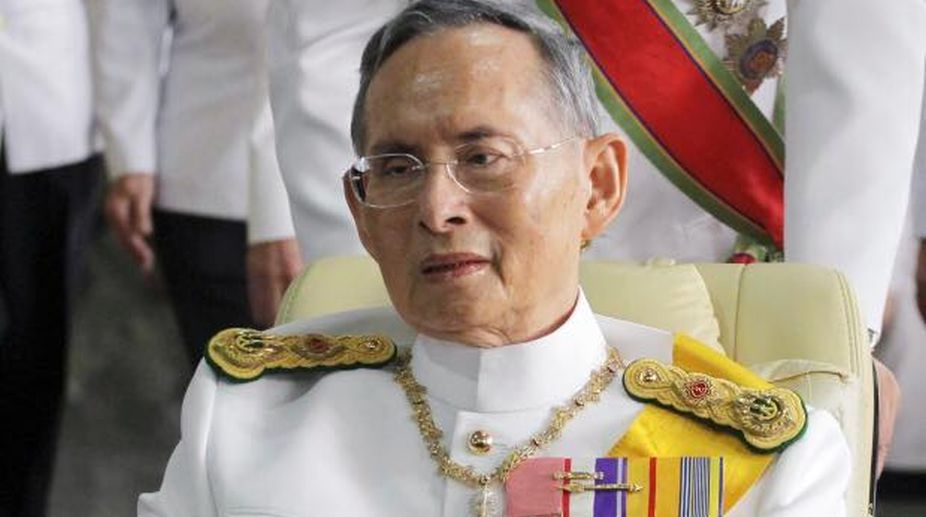Blackpink’s Lisa joins ‘White Lotus’ Season 3
K-pop all-girls superband Blackpink member Lisa has joined the cast of 'The White Lotus' Season 3.

Bhumibol Adulayadej (Photo: Facebook)
“In the 1950s it might have been said that the Thai people respected Bhumibol because he was their King, now in the 2000s they respect their king because he is Bhumibol”
A constitutional monarchy, Thailand, said its final good-bye to late King Bhumibol Adulyadej, Rama IX, on 25 October 2017. A magical era of 70 years thus ends. Adulayadej’s only son Maha Vajiralongkorn takes over as Thailand’s new King and has the huge shoes of his father to fill. Bangkok has prepared for about a year now for Thailand’s event of the century costing its citizens some $90 million. Bhumibol was the world’s longest reigning monarch.
Two of Thailand’s monarchs – King Chulalongkorn (Rama V) and King Adulayadej – truly stand out for their efforts to modernise Thailand. Foreigners find inexplicable the special relationship between the Thai people and King Bhumibol. Those with absolute power and those whose function is ceremonial are the two usual kinds of royalty.
Advertisement
King Adulyadej fell into neither of those categories. He towered over successive civilian governments and the Thai military even as he possessed a moral authority more powerful than that of any government Thailand ever had. At the same time, he could look ordinary people in the eye, understand their lives, and could truly empathize with them. Naturally, he inspired a high level of love, devotion and reverence among the Thais.
King Bhumibol was a modern and a peoples’ king. In 1969, successful cloud-seeding made him a rainmaker, turning him in the eyes of Thais into a semi-divine monarch. To Adulayadej , development was a peacetime weapon. In 1980, UNESCO named his composition “Falling Rain” as the “Song of Asia”. To this photographer and painter king, jazz and blues remained a major part of his musical life. A champion of religious and cultural diversity, he promoted peaceful coexistence among the country’s different religious, cultural and ethnic groups.
Thai Muslims remember Adulayadej for the publication of a Thai edition of the AlQuran. In 1995, Adulayadej instituted distance education via radio. His hands-on approach on revolutionised agriculture, fish breeding, rice cultivation, ploughing techniques, rainwater harvesting, and road infrastructure made him a peoples’ king. Little wonder, he was winner of the 1st UNDP human development lifetime achievement award for his work on rural sustainable development. Bhumibol Adulayadej successfully transformed the declining Thai monarchy into the country’s most important political institution.
The spread of communism in Cambodia, Laos and Vietnam during the 1960s and 1970s was one of King Bhumibol’s biggest challenges. He worked intimately with the army throughout the Cold War with the support of the United States. Together, they were able to turn Thailand into a pro-U.S., anti-communist and pro-monarchy country.
Thailand was never colonized. Siam, as it was called then, led by King Chulalongkorn successfully negotiated its political independence with European powers to which his Indian connection remained important. In 1871, Chulalongkorn visited India, the purpose being to observe India’s development under British rule. While in Calcutta, he inspected a mint, fort, museum, gun factory, waterworks distribution plant, rice mill, prison, hospital, market, and church. He rode a train to Delhi while also visiting Agra, Lucknow, Bombay and Benaras.
Geographically, India and Thailand share a maritime boundary in the Andaman Sea. India’s bilateral relations with Thailand are rooted in history, age-old social and cultural interactions and extensive people to people contacts. The shared link of Buddhism is reflected in regular pilgrimages to places of Buddhist interest in India by a large number of Thai people. Hindu elements can be found reflected in Thai architecture, arts, sculpture, dance, drama and literature. The Thai language incorporates Pali and Sanskrit influences.
A large Indian diaspora living and working in Thailand too binds the countries. India’s relations with Thailand are important to counter Chinese hegemony. India plans to revive a trilateral highway crossing to link northeastern India with markets in Thailand and beyond. Bangkok is key to the Modi government’s “Act East” policy. The Asian Development Bank would fund the road link under its South Asian Sub regional Economic Cooperation programme.
Year 2018 marks the 25th anniversary of ASEAN-India relations. India’s policy is premised on non-interference and economic cooperation to which Thailand is pivotal in Indochina. Thailand has witnessed some 21 military coups and two of Thailand’s former prime ministers have been charged by Thai court for corruption.
The survival of constitutional monarchy in Thailand relies much upon the royalty’s ability to reinvent itself at personal, national and international levels while arbitrating between civil and military relations. The new King Maha Vajiralongkorn is then set to walk that road but without his father’s charm.
(The writer teaches at the Jindal Global Law School, Sonipat)
Advertisement